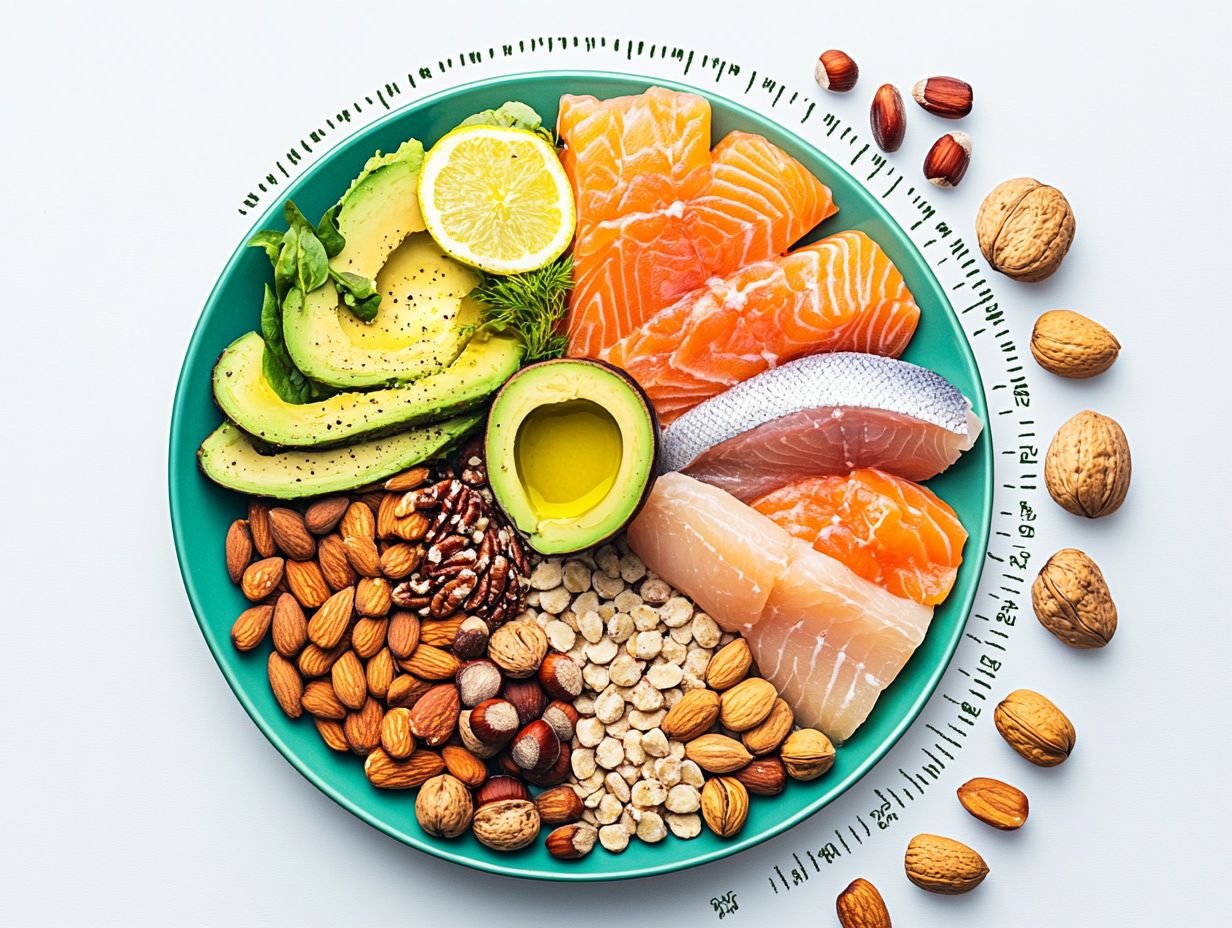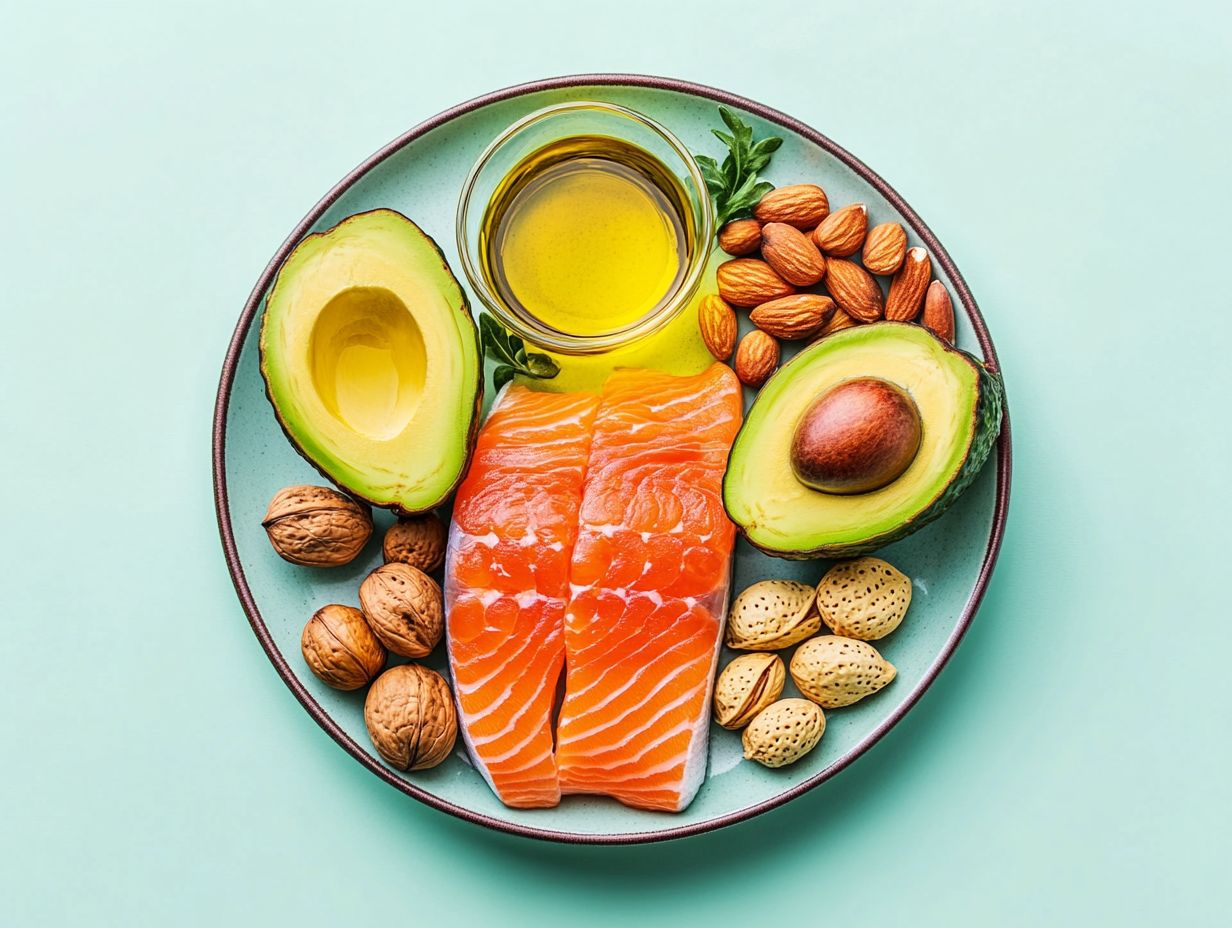Understanding Fats in Dietary Guidelines
Dietary fats are often misunderstood, yet they play a vital role in your overall health.
From energy production to nutrient absorption, fats are essential for your body s functions. This discussion breaks down the different types of dietary fats saturated, unsaturated, and trans emphasizing their unique roles in your diet.
Explore recommended fat intake guidelines, the health implications of excessive fat consumption, and practical tips for making healthier fat choices. Discover how to navigate the world of dietary fats to achieve a balanced and nutritious lifestyle.
Contents
Key Takeaways:

Understanding dietary fats is key to making healthy food choices. Fats play an important role in the body and are essential for various functions, such as providing energy and aiding in nutrient absorption. Follow recommended amounts to stay healthy and choose healthier sources of fats, while also being aware of the health implications of excess fat consumption.
What are Dietary Fats?
Dietary fats are essential nutrients our bodies need in large amounts. These fats saturated, unsaturated, and trans are crucial for various bodily functions, including energy provision, nutrient absorption, and hormonal regulation.
The three main types of dietary fats serve distinct purposes in your body. For example, saturated fats, often found in animal products, can influence your cholesterol levels when consumed in excess.
Unsaturated fats, like those from avocados, nuts, and olive oil, are celebrated for their numerous health benefits, including improved heart health and reduced inflammation.
Trans fats, on the other hand, commonly found in processed foods, are considered harmful and should be minimized due to their negative effects on heart health. Balancing your fat intake is vital for your health, as these nutrients support brain function, energy levels, and the absorption of fat-soluble vitamins.
By understanding these distinctions, you can make enabled choices about healthier fat sources, ultimately enhancing your overall wellness.
Types of Dietary Fats
You can categorize dietary fats into three primary types: saturated fats, unsaturated fats, and trans fats, each offering unique characteristics and implications for your health.
Saturated fats, commonly found in animal products and certain plant sources, can raise LDL cholesterol levels. In contrast, unsaturated fats, which include monounsaturated and polyunsaturated fatty acids, support heart health.
Trans fats, typically present in hydrogenated oils, are considered harmful and should be minimized in a healthy diet.
Saturated, Unsaturated, and Trans Fats
Saturated fats, often solid at room temperature, primarily come from animal products, while unsaturated fats are liquid and can be divided into monounsaturated and polyunsaturated categories, each offering distinct health benefits.
Trans fats, frequently created through industrial hydrogenation, have faced significant criticism for their negative effects on heart health, specifically by raising LDL cholesterol levels. To maintain optimal health, it becomes essential for you to balance these fats in your diet.
Understanding where these fats originate is key to making informed dietary choices. Saturated fats are commonly found in red meat, butter, and full-fat dairy, whereas healthier unsaturated options can be sourced from olive oil, avocados, and nuts.
Growing research indicates that unsaturated fats can also lower total cholesterol and reduce the risk of heart disease, making them a valuable addition to your diet.
On the other hand, trans fats lurk in processed foods and baked goods, elevating harmful cholesterol levels while simultaneously lowering beneficial HDL cholesterol. Therefore, it s vital for you to consume fats in moderation and prioritize healthier options to support your overall well-being.
Role of Fats in the Body

Fats are integral to your body, fulfilling several essential functions. They are a key source of energy and aid in the absorption of fat-soluble vitamins. They also provide protection for your vital organs.
These nutrients are crucial for hormone production and the formation of cellular structures. Dietary fats also provide fatty acids that your body needs but can’t make itself, highlighting their significance in a balanced diet.
Understanding how fats work is key to keeping your heart healthy and thriving!
Functions and Importance of Fats
The functions of dietary fats go well beyond simply providing energy. They are essential for absorbing fat-soluble vitamins like A, D, E, and K, and they play a crucial role in maintaining healthy cholesterol levels.
Fatty acids, such as omega-3 and omega-6, not only contribute to heart health but also support cognitive function. By understanding the significance of fats in your diet, you can make informed food choices that enhance your overall well-being.
Dietary fats are vital for hormonal balance and serve as the building blocks for hormone production. This balance influences mood regulation and metabolic processes.
Fats are also fundamental to the structural integrity of cells, ensuring that cell membranes remain flexible and functional. Omega fatty acids, in particular, are renowned for their anti-inflammatory properties. These properties are beneficial for cardiovascular health, helping to optimize blood circulation and lower triglyceride levels, thereby reducing the risk of heart disease.
Dietary Guidelines for Fat Intake
Dietary guidelines for fat intake advocate for a balanced approach to your consumption of fats. To learn more, you can explore understanding the science behind dietary guidelines, which states that total fat intake should represent a specific percentage of your daily energy budget.
According to the World Health Organization (WHO) and the American Heart Association (AHA), it’s crucial to limit saturated fat intake to mitigate the risk of heart disease. Simultaneously, prioritizing healthy fats in your diet is essential for achieving optimal health outcomes.
Recommended Amounts and Sources
The recommended amounts of dietary fats can vary based on individual needs, but general guidelines suggest that healthy fats should constitute a significant portion of your total daily calorie intake.
- Prioritize food sources rich in healthy fats think avocados, nuts, seeds, and vegetable oils.
- Keep saturated fat intake in check for optimal heart health.
- Aim for healthy fats to make up about 20-35% of your total daily calories.
- Limit saturated fats to no more than 10% of your total daily intake.
This means incorporating delectable sources like fatty fish, olive oil, and flaxseeds, which not only provide essential fatty acids but also enhance your overall nutritional balance.
By consciously including these healthy fats in your meals like adding creamy avocado slices to your salads or enjoying a handful of crunchy almonds as a snack you can support your cardiovascular health while indulging in a delightful variety of flavors and textures in your diet.
Health Implications of Excess Fat Consumption

Excessive consumption of dietary fats, especially trans fats and saturated fats, can substantially heighten your risk of heart disease and obesity. A diet high in these fats may result in elevated cholesterol levels, paving the way for cardiovascular issues and other health complications.
Don’t underestimate the power of fats! Making smart choices today can lead to a healthier heart tomorrow. Grasping the health ramifications of excessive fat intake is crucial for making informed and conscientious dietary choices.
Impact on Cardiovascular Health and Weight
Dietary fats significantly impact cardiovascular health and weight management. Diets high in saturated and trans fats can raise cholesterol levels, increasing the risk of heart attacks and strokes.
On the other hand, adding healthy fats to your meals can help with weight management and improve heart health. Understanding the types of dietary fats is crucial for making informed choices.
Unsaturated fats, found in avocados, nuts, and olive oil, can lower bad cholesterol levels. These fats promote a heart-healthy lifestyle.
In contrast, trans fats, often present in processed foods, raise bad cholesterol and lower good cholesterol, increasing cardiovascular risks.
By replacing saturated fats with healthier options, you can create a balanced diet. Simple swaps like using olive oil instead of butter can significantly boost heart health and support weight loss.
Making Healthy Fat Choices
Choosing healthy fats requires understanding nutrition labels and cooking methods. Focus on food sources that positively impact your diet.
By choosing nutrient-rich options and avoiding unhealthy fats, you can improve your health and well-being.
Tips for Choosing and Preparing Healthy Fats
To choose and prepare healthy fats, include sources like vegetable oils, nuts, and seeds in your meals. Use cooking methods that preserve the nutritional value of these fats.
Opting for oils like olive, avocado, and coconut can enhance flavor and nutrition. Remember, even healthy fats can be high in calories, so portion control is essential.
Cooking methods such as roasting or grilling help maintain the integrity of these fats and improve dish flavors. Incorporate a variety of fats from fish, seeds, and avocados for a well-rounded intake of essential fatty acids. This supports heart health and vitality.
Frequently Asked Questions

What are dietary guidelines and why is understanding fats important?
Dietary guidelines are recommendations for healthy eating, developed by government agencies. Understanding nutritional labels is vital because fats are essential nutrients that affect overall health.
What are the different types of fats and how do they impact our health?
The main types of fats are saturated, unsaturated, and trans fats. Saturated fats, found in animal products, can increase heart disease risk.
Unsaturated fats, found in plant foods and fish, benefit heart health. Trans fats, found in processed foods, are harmful and should be avoided.
What is the recommended daily intake of fats?
Fats should make up 20-35% of your daily calorie intake. Focus on balancing all types of fats while limiting saturated and trans fats.
Are all fats unhealthy?
No, not all fats are unhealthy. Some fats, like unsaturated fats from avocados, nuts, and olive oil, are essential for our body.
How can I reduce my saturated and trans fat intake?
To cut down on saturated fats, choose lean meats and low-fat dairy products. Limit processed and fried foods.
To reduce trans fat intake, read food labels. Avoid products with hydrogenated oils.
Can I replace fats with carbohydrates?
No, don’t replace fats with carbohydrates. Carbs provide energy, but you should balance both in your diet.






